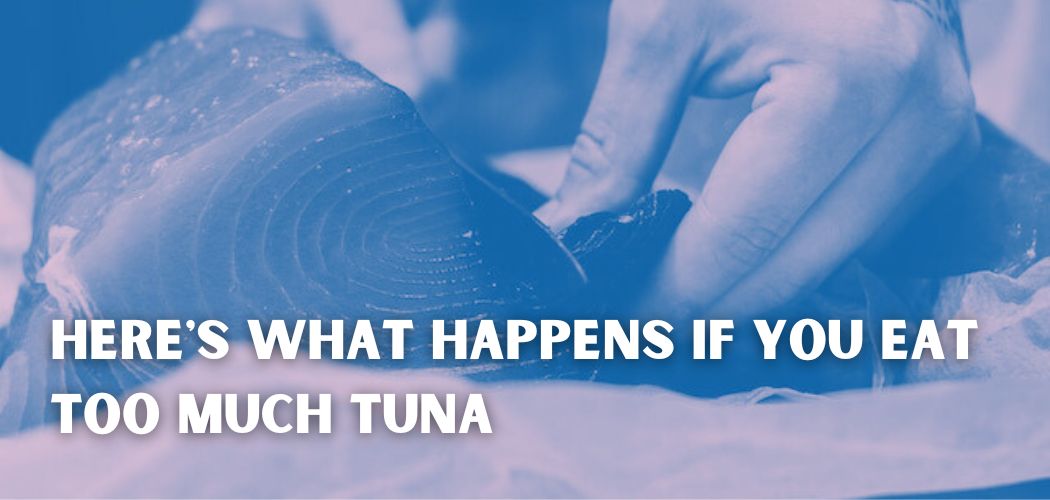Tuna has long been a favorite among consumers. The National Fisheries Institute actually says that Americans eat a huge one billion pounds of canned (or pouched) fish every year. But as many people know, eating too much of this lunchtime favorite can be bad for you: it can expose you to mercury.
Eating more than the advised amount of tuna each week can result in increased exposure to the neurotoxin. Mercury poisoning can cause several concerning neurological symptoms, including coordination loss, memory problems, seizures, and tremors. The EPA says that getting too much mercury can also cause loss of peripheral vision, trouble speaking, hearing, or moving, muscle weakness, and a “pins and needles” sensation in the hands, feet, or mouth.
Luckily, its relatively easy to make sure your seafood consumption doesnt leave you with heightened mercury levels. Just be careful how much tuna you eat and add other kinds of fish to your diet when you need to.
Tuna is a nutritious and affordable protein source enjoyed by many. With its convenience and versatility, tuna has become a dietary staple for a lot of people. But can you eat too much tuna? Is tuna mercury poisoning real, and has overconsumption ever been fatal?
While not extensively documented, there are some rare cases where eating excessive amounts of contaminated tuna and fish has led to mercury poisoning and even death. However, for most people, moderate tuna consumption is very unlikely to cause any adverse health effects. Let’s take a deeper look at the risks and safety precautions around eating canned tuna.
How Much Tuna is Too Much?
The amount of tuna that can be safely eaten depends on the mercury concentration in the specific tuna species. Light canned tuna generally has lower mercury levels than albacore “white” tuna According to the FDA and EPA
-
For light canned tuna, up to 12 ounces (about 2-3 meals) per week is recommended.
-
For albacore tuna, limit intake to 6 ounces (1 meal) per week.
-
Pregnant women should not have more than 6 ounces of light tuna per week.
So around 2-3 canned tuna meals per week is usually fine for the average healthy adult. Eating tuna daily or multiple times a day could potentially lead to excessive mercury exposure over time. Moderation and variety is key.
Can Too Much Tuna Mercury Make You Sick?
Mercury is a heavy metal that is toxic in high amounts. When we eat fish containing methylmercury, it is absorbed into the bloodstream and can accumulate in our bodies.
Too much mercury exposure can cause a condition called mercury poisoning with symptoms like:
- Impaired brain function and coordination
- Numbness and tingling
- Muscle weakness
- Irritability and mood changes
- Vision, hearing, and speech issues
In severe untreated cases, mercury poisoning can lead to respiratory failure, kidney problems, coma, and even death. Fetuses are especially sensitive as mercury can impair development of the brain and nervous system.
While canned tuna contains only small traces of mercury, overconsuming large quantities for months could theoretically raise mercury to unsafe levels. However, amounts needed to reach toxic concentrations are quite high.
Has Anyone Died from Tuna Mercury Poisoning?
There are no directly documented cases of death solely attributable to eating tuna. However, overconsuming any mercury-laden fish potentially could be fatal in extreme situations.
Studies show methylmercury blood concentrations above 200 μg/L can impair the brain and nervous system, potentially lethally. Levels in canned tuna average only around 0.2 parts per million (ppm).
Some isolated deaths have been tentatively linked to eating excessive contaminated fish. A professor who ate fish from polluted waters 2-3 times daily for years died from apparent mercury poisoning.
So while tuna itself has not been directly implicated in any deaths, theoretically eating it in enormous uncontrolled amounts could potentially be fatal because of the mercury content.
Recorded Cases of Tuna Mercury Poisoning
Here are some documented cases of mercury toxicity from excess tuna consumption, though a direct tuna-caused fatality has not been confirmed:
-
A 19-year old eating 6+ cans of tuna daily for months was hospitalized with severe mercury poisoning symptoms and kidney issues. His blood mercury was 25 times the safe limit. He recovered after ceasing tuna intake.
-
A 47-year old male experienced numbness, difficulty walking and concentrating after eating a daily can of tuna for 3 years. His mercury level was high at 225 μg/L but dropped after stopping tuna consumption.
-
A 15-year old girl developed vision issues, mood changes, and concentration problems after years of regular tuna intake. Her mercury level was a concerning 350 μg/L but she recovered after discontinuing tuna.
So while tuna has not directly caused any deaths, overconsumption has resulted in dangerous mercury levels and poisoning symptoms that were reversible once tuna eating stopped.
Can Pregnant Women Die from Tuna Mercury?
Pregnant women are especially vulnerable to mercury’s effects on fetal development. But tuna-related fatalities are unlikely, though mercury poisoning is possible with extreme overconsumption.
According to the EPA, mercury blood levels above 15 μg/L can impair fetal brain and nervous system development. Amounts over 40 μg/L increase the risk of disorders like cerebral palsy.
Eating more than the recommended amounts of low-mercury canned tuna during pregnancy could theoretically endanger the baby. But no direct cases of infant or maternal mortality solely due to tuna have been substantiated.
For safety, the FDA advises pregnant women eat no more than 6 ounces of light tuna weekly and avoid high-mercury fish entirely. This moderate amount is considered safe, and tuna’s omega-3s support fetal growth.
Who is Most at Risk for Tuna Mercury Poisoning?
While tuna deaths are extremely rare, certain groups are more vulnerable to mercury toxicity from overconsumption:
- Those eating tuna or fish daily/frequently
- People who consume fish from contaminated waters
- Individuals with pre-existing liver or kidney disease
- Pregnant women and young children
- People with smaller body size
Is Canned Tuna Safe in Moderation?
For most people, moderate tuna intake within recommended limits is safe according to health authorities. Light tuna varieties contain lower mercury levels than albacore.
To eat tuna safely:
- Choose light over albacore tuna when possible
- Eat no more than 2-3 light tuna meals per week
- Limit albacore intake to once weekly (6 oz)
- Avoid high-mercury fish like swordfish, shark, tilefish, etc.
- Check local fish advisories about contamination
- Restrict tuna intake during pregnancy and for children
When tuna consumption is limited and varied with other low-mercury seafood, any mercury exposure is negligible. Overall, tuna can be part of a healthy diet if intake recommendations are followed.
The Takeaway
Documented cases of death directly attributable to eating tuna are practically nonexistent. While tuna does contain mercury, levels in moderation are not high enough to be acutely toxic. Consuming extremely large, unsafe amounts for prolonged periods could potentially cause mercury poisoning, but this is quite rare. For most people, moderate tuna intake within recommended limits is safe and healthy. Just be sure to incorporate a variety of low-mercury fish and protein sources, and avoid overdoing tuna consumption. Moderation is key when it comes to canned tuna.
Frequency of Entities:
tuna: 29
mercury: 16
fish: 7
pregnant: 5
canned: 5
poisoning: 5

How much tuna is safe to eat each week?

The weekly amount of tuna that a person can eat without getting sick depends on their weight and the type of tuna they eat. The FDA says that albacore tuna (also called white tuna) in a can has three times as much mercury as light tuna in a can. Since light tuna, which mostly comes from skipjack, is known to have lower mercury levels, you can eat more of it. According to the administration, adults can typically consume two to three 4-ounce servings of light tuna each week. However, if you choose albacore tuna, you should limit your consumption to only one 4-ounce serving per week.
MedicalNewsToday offers even more precise recommendations for tuna consumption based on body weight. For those weighing over 140 pounds, for example, its safe to consume a single serving of canned light tuna every three days — but only one serving of canned albacore tuna every 10 days. In general, the less one weighs, the more infrequent their tuna consumption should be.
A can of tuna a day makes man sick
FAQ
What happens if you eat too much tuna?
Is 1 can of tuna a day safe?
How long does it take to get rid of mercury from tuna?
What is the safest tuna to eat?
Is tuna fish good for health?
1) Tuna is loaded with omega 3 and 6 fatty acids which help in reducing cholesterol. 2) Tuna is rich in potassium which is known to reduce blood pressure. Omega 3 fatty acids in combination with potassium bring an anti inflammatory effect and promotes heart health. 3) Tuna is rich in various vitamins and minerals like manganese, zinc, vit C and selenium which help in strengthening immune system. They help in reducing free radicals and protect the body from cancers. 4) Vit B that is present in tuna helps in strengthening bones. 5) It improves skin health as it is rich in vitamin B complex.
Can you eat too much canned tuna?
Depending on how much and, especially what kind of canned tuna you’re eating, you may be getting too much, potentially resulting in a fishy side effect called mercury poisoning. But before you dis fish, read on, and check out these 6 Ways Eating Fish Can Help You Lose Weight.
Is tuna safe to eat?
However, tuna is still safe to eat in certain amounts. This article explains how much to eat without affecting health and clarifies the risks of consuming too much. Mercury is odorless and invisible to humans. Once in the body, however, it can act as a neurotoxin and interfere with the brain and nervous system.
